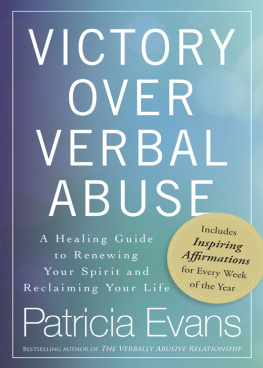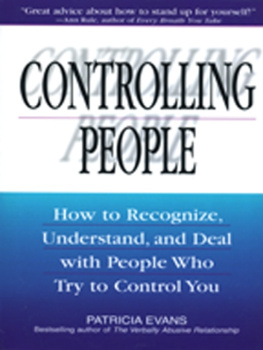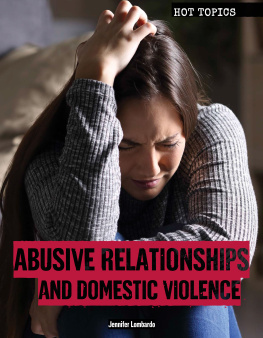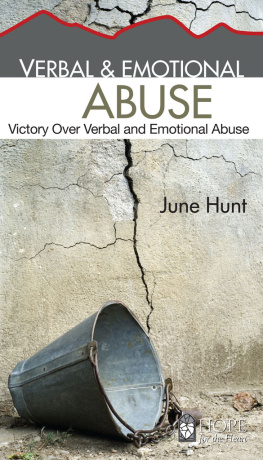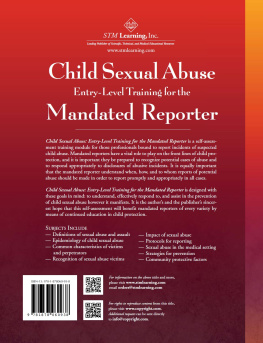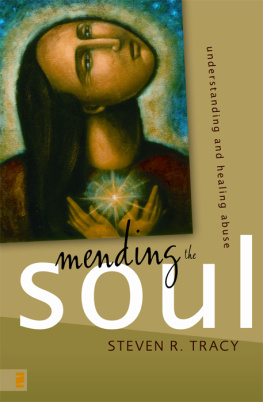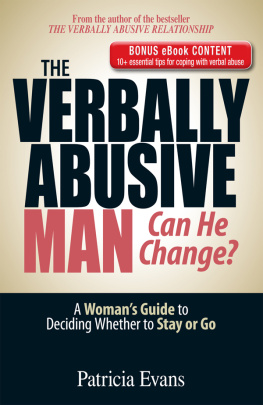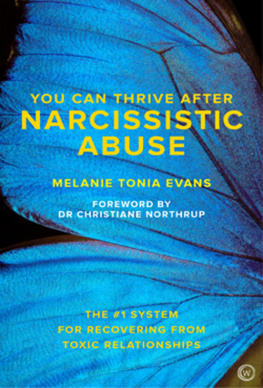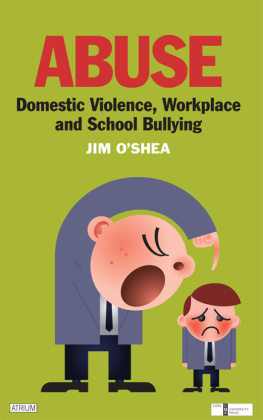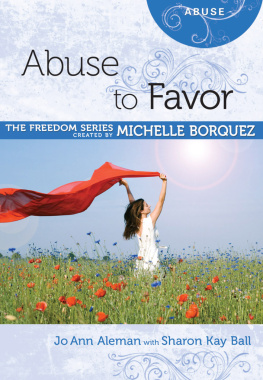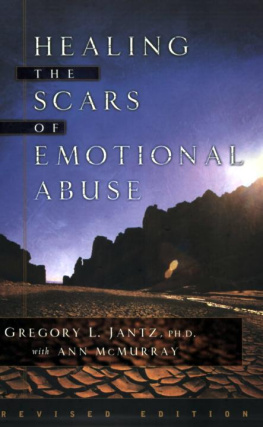
Thank you for downloading this Simon & Schuster ebook.
Get a FREE ebook when you join our mailing list. Plus, get updates on new releases, deals, recommended reads, and more from Simon & Schuster. Click below to sign up and see terms and conditions.
CLICK HERE TO SIGN UP
Already a subscriber? Provide your email again so we can register this ebook and send you more of what you like to read. You will continue to receive exclusive offers in your inbox.
The Verbally Abusive Relationship
Expanded Third Edition
How to Recognize It and How to Respond
Patricia Evans
Avon, Massachusetts
Copyright 2010, 1996, 1992 by Patricia Evans.
All rights reserved. This book, or parts thereof, may not be reproduced in any form without permission from the publisher; exceptions are made for brief excerpts used in published reviews.
Published by
Adams Media, an imprint of Simon & Schuster, Inc.
57 Littlefield Street, Avon, MA 02322. U.S.A.
www.adamsmedia.com
ISBN 10: 1-4405-0463-6
ISBN 13: 978-1-4405-0463-1
eISBN 10: 1-4405-1010-5
eISBN 13: 978-1-4405-1010-6
2nd edition ISBN 10: 1-55850-582-2
Library of Congress Cataloging-in-Publication Data
is available from the publisher.
This ebook version: November 2012
This publication is designed to provide accurate and authoritative information with regard to the subject matter covered. It is sold with the understanding that the publisher is not engaged in rendering legal, accounting, or other professional advice. If legal advice or other expert assistance is required, the services of a competent professional person should be sought. From a Declaration of Principles jointly adopted by a Committee of the American Bar Association and a Committee of Publishers and Associations
Acknowledgments
I am grateful to all who supported me in writing this book. Especially, I wish to acknowledge the many women who so courageously shared their stories and their insights with me.
While I wrote and rewrote, I had constant encouragement from my sister, Beverly Amori. She never for a moment let me harbor any doubts about the value of this work. Robert Brownbridge, L.C.S.W., brought me clarity and taught me to trust myself.
The books theme originated with a suggestion from Carl Putz, Ph.D.: If you could only tell people how to recognize verbal abuse, that would be something! I thank Carl, not only for suggesting the theme of recognition, but also for having given me the realization that I could write.
I am grateful to Patricia Seereiter, who contributed her quiet strength, her lively spirit, and the serenity of her studio oasis a perfect place to write.
Pat Corrington, L.C.S.W., cheered me with her wonderful enthusiasm and provided her editing skills as well. She has a special place in my heart. Susan Hiraki, M.F.C.C., most graciously gave me encouragement and insightful commentary.
I thank Kate Gann for her interesting contributions and Donna and friends for their unfailing emotional support.
Central to making this edition a reality are the following people, to whom I am most grateful: Helen McGrath, my agent, a constant source of encouragement always ready to help; Ed Walters and Paula Munier, my editors, both a joy to work with; narrative therapist Linda Crawford of San Diego, my resource and guide into the world of narrative therapy; Craig Smith, Ph.D., Richard Maisel, Ph.D., and their colleagues, who welcomed me to their conferences. Thanks to all.
Finally, I am especially grateful to my children for their continuing confidence in me.
Patricia Evans
Contents
Foreword
Since the first edition of this book was published in 1992, the landscape of verbal abuse has changed. Since that time, I with the help of many people have done what I could to spread the word that there is such a thing as a verbally abusive relationship. Oprah dedicated a whole show to this subject, even titling it, The Verbally Abusive Relationship. Many other TV and radio hosts have also contributed to this effort by giving me time and space to spread the word.
Organizations of all kinds have invited me to speak. Ive done so not only in the United States, but also in Canada, Australia, and Spain, where the Spanish governments newly formed Commission for the Investigation of Violence Against Women heard me speak in simultaneous translation. In addition, earlier editions of this book have been printed in many languages, including French, German, Spanish, Russian, Polish, Yugoslavian, and Chinese.
READERS JUST LIKE YOU ARE TALKING
My readers have done a tremendous job spreading the word about this topic. In the years since the first edition of this book, which introduced the term verbally abusive relationship to the world, many thousands of women have contacted me by phone, e-mail, or letter. Usually callers have a quick question or they want to arrange a private consultation for information and referrals. But theyve also told me of the verbal abuse theyve suffered in their relationships. Theyve wanted clarity. Thousands have told me, I knew something was wrong; I just didnt know what. Now I have a name for what Ive suffered. The culture is changing. Verbally abusive relationships are recognized as real.
In all of my books, Ive attempted to answers the questions people ask me:
- Why do I feel so badly? What is happening in my relationship? In this book, The Verbally Abusive Relationship , they find a name for what they suffer.
- Is there more to know? Are there other controlling behaviors in my relationship? In Verbal Abuse Survivors Speak Out , I explain the other forms of control.
- Whats wrong with people who are verbally abusive? Why was he so nice and then so mean? In Controlling People , I offer insight and advice in answer to these questions.
- What would it take for a verbally abusive person to change? Can verbally abusive men stop their abusive behavior? In The Verbally Abusive Man, Can He Change? , readers can take the steps I suggest to request change, and, most importantly, wake up the abuser, if they wish. They can best make this effort, if they so desire, if they are grounded in the knowledge they have gained in the first three books.
ITS NOT JUST WOMEN WHO SUFFER FROM VERBAL ABUSE
I hear from men, too. When a man contacts me who feels he is going crazy from his partners verbal abuse, I tell him that if, over the years, he has heard verbal abuse from a woman again and again, I dont know if she can change. I havent seen a verbally abusive woman change that is, one who constantly criticizes, accuses, or rages at him. However, he, too, can follow the steps I outline to request change.
In the last ten years, several dozen men, at most, who were experiencing verbal abuse in their relationships have contacted me. Their partners did not seek help. Verbally abusive women are those who constantly accuse and criticize their mates, and some rage at them. These women are not suddenly, angrily responding to years of verbal abuse while in the process of ending the relationship. Instead, theyve been abusive over a number of years.
Verbally abusive women often have psychological disorders. I have not known these abusive women to seek help even when they face divorce. Some, as if they were victims, even initiate divorce. They seem to believe their accusations. In other words, their accusations are automatic explanations (confabulations) that their mind forms that explain to them why they feel attacked by their spouses personhood, his success, or even his happiness. Similarly, men who abuse their wives also form confabulations as to why they feel attacked by her personhood.
Next page

